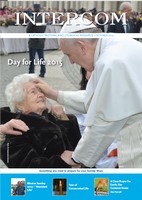 October 2015 issue
October 2015 issue
Click on link to view Intercom October contents
Editorial and Newsletter resources
Feature Article Day for Life 2015: ‘Cherising Life – Accepting Death’ (pdf)
by Bishop Brendan Leahy
The Annual Day for Life message offers an occasion to focus on one specific aspect regarding the meaning and value of human life. Prepared by the Catholic Church in Ireland, Scotland, England and Wales, this year’s message looks at end of life decisions.
The advances in medicine and in technology mean that the taking of decisions about appropriate care for people who have advanced and progressive illness have become more complex. This year’s message echoes points made by the Irish Bishops in a 2002 statement on ethical and pastoral issues surrounding the end of life care: ‘In caring for people who are dying, there are two extremes to be avoided: trying to keep people alive at all costs, even when it is clear that death is imminent, and deciding to end the life of a person on the basis that his or her life is no longer worth living’. The Irish Bishops’ 2002 Statement is found in the Irish Catholic Catechism for Adults (Veritas), pp. 175-177.
This year’s message is short and produced by Veritas in an attractive card format. Further information can be found on the Irish Bishops’ Conference website. The message is brief and focuses on essential points. There are many other principles in Church teaching that have a bearing on end of life decisions. The following is a digest of those principles.
Respect for the life of every person
Respecting life means that every person must be valued for as long as they live. Every person is loved by God and every life is a precious gift never to be destroyed or neglected. It is wrong to hasten or bring about death. God will call us in his good time.
Life need not be preserved at all costs
Due respect for my life is compatible with the judgment, ‘this medical treatment is no longer worthwhile’, either because such treatment no longer serves its purpose (is futile), or because it is overly burdensome, dangerous or disproportionate to the expected outcome: there is no obligation to accept ‘over-zealous’ treatment, traditionally called ‘extraordinary’ by the Church.
Making a medically informed decision
Before deciding the right thing to do, I need to know what is wrong with me, or my loved-one, what is likely to happen and what might be the benefits and risks of different treatments. It is important to listen to the doctors but also to ask questions. I need to make sure that doctors or nurses are not making assumptions about my condition or about what I would want. If I am not sure about this I can ask for a second opinion by a different doctor.
The burdens of treatment are relative to the person
Judgments about what counts as excessively burdensome are relative to my sensitivities, sensibilities, physical condition and situation. The decisions should be made me if I am competent or, if not, by those legally entitled to act for me. Doctors should always respect my reasonable decisions and my legitimate interests.
Caring and accepting care
I may not be conscious or I may be confused when decisions need to be made about my care. This is why it is good to speak to those close to us about what we would want. It is important not to give into the temptation that others would be better off without us. We should allow them to show their love and care for us.
Food and water are basic needs
Some forms of treatment or care are more basic than others. In particular the giving and accepting of food and drink, by tube if necessary, is part of ordinary care for ourselves and hospitality to others. We should not be denied food or drink except when they are no longer effective in sustaining life.
Acceptance of death is part of Christian hope in the resurrection from the dead
For the Christian, the moment of death is the time when God comes to take us home. If we die accepting God’s mercy then we can look forward to the resurrection, reunion with those who have gone before, and unimaginable joy.
Intercom
Intercom is a pastoral and liturgical resource magazine published by Veritas, an agency of the Irish Catholic Bishops Commission on Communications.
There are ten issues per year, including double issues for July-August and December-January.
For information on subscribing to Intercom, please contact Ross Delmar (Membership Secretary):
Tel: +353 (0)1 878 8177 Email: [email protected], or click here to subscribe online.

